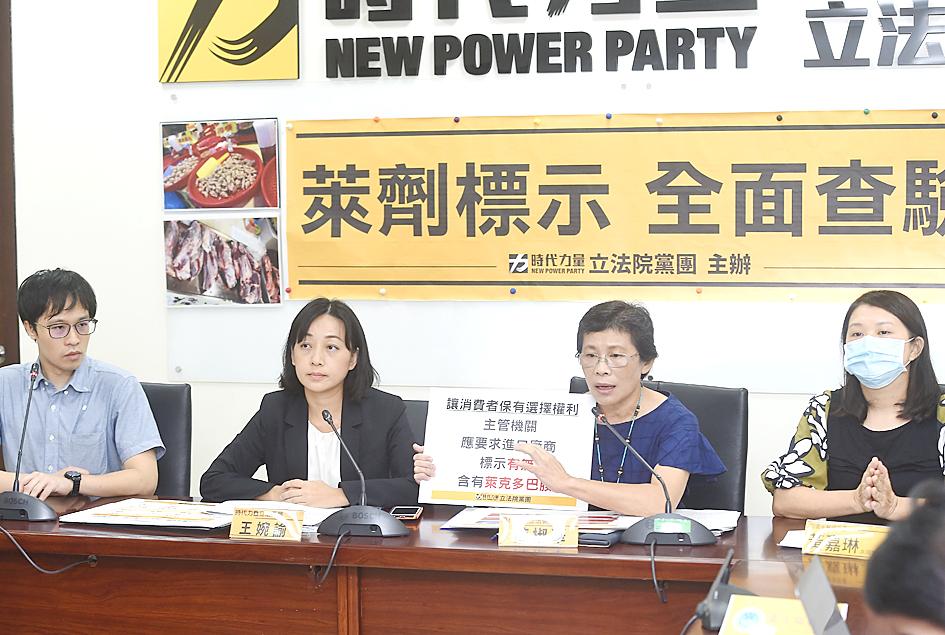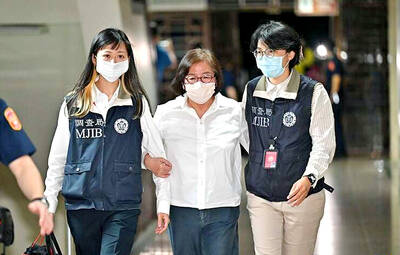The New Power Party (NPP) yesterday questioned the government’s capability to handle increased imports of US meat products, while urging the Ministry of Health and Welfare to design a label that easily identifies US beef and pork products containing traces of the food additive ractopamine.
The ministry has said that it would use the strictest standards and conduct a batch-by-batch inspection of US beef and pork, NPP Legislator Claire Wang (王婉諭) said.
However, in the Food Safety Policy White Paper it published in 2016, the ministry said that the number of food inspection personnel at the nation’s borders were not enough to handle the rising demand.

Photo: Chien Jung-fong Taipei Times
“The fact is the government has not increased the number of food inspectors since then, with only 81 inspectors stationed at border controls in the past three years. The inspection rate of imported meat and meat products was only 4 percent. We doubt if the inspectors would be able to conduct intensive inspections as the ministry has promised with expanded imports of US meat products,” Wang said.
Minister of Health and Welfare Chen Shih-chung (陳時中) should fulfill his promise of having comprehensive supplementary measures in place before the nation further opens its borders to US beef and pork on Jan. 1 next year, she said.
Inspections of US meat products should not interfere with examinations of other food products, she added.
In its random inspections of meat products on the market, the government examines fewer than 2,000 stores and restaurants annually, with about one-quarter of them failing the inspections, Wang said.
“We found that the total number of inspectors at local governments across the nation dropped from 715 last year to 684 this year,” she said.
“Aside from food products, they are also in charge of inspecting drugs and cosmetics sold in markets. When food and the pharmaceutical product inspectors at the central government are added in, the nation has only 767 people working to ensure the safety of food we consume, which means one inspector is in charge of ensuring food safety for about 30,000 people,” she said.
Despite mounting concerns over US pork imports, the ministry circumvented legislative oversight by not sending representatives to three news conferences hosted by the party this week, as well as public hearings in the past two weeks, Wang said.
The US Department of Agriculture (USDA) labels meat product as “USDA Organic” only if they do not contain ractopamine, NPP Legislator Chen Jiau-hua (陳椒華) said.
The USDA label includes a statement: “The use of ractopamine is banned in many countries,” she added.
This year the Canadian government made ractopamine-free a criterion for meat products to receive a quality label, Chen said.
The ministry’s label for meat products should inform the public if they contain ractopamine, so that consumers can make informed choices, she said, adding that the party strongly opposes the import of internal organs from US pigs.
The School Health Act (學校衛生法) states the meals provided at all school levels “shall give priority” to using quality local agricultural products, which means schools might still use US pork and beef products, GMO Free Food campaign cofounder Huang Chia-lin (黃嘉琳) said.
The government would have difficulty in ascertaining the source of processed meat products, as residues of ractopamine can only be found by testing the blood of fresh meat, she said.
The government would not have enough personnel to effectively prevent schools from using pork and beef containing traces of ractopamine, as the nation has only about 300 to 400 school lunch secretaries, who manage the school lunches of 3,000 elementary to senior-high schools.
“The ministry needs to tell the public the amount of internal organs and entrails of pigs consumed in Taiwan each year and how much of it is imported. It also needs to tell us the health risks the public would be exposed to if pork containing traces of ractopamine circulates in the market,” she said.

Costa Rica sent a group of intelligence officials to Taiwan for a short-term training program, the first time the Central American country has done so since the countries ended official diplomatic relations in 2007, a Costa Rican media outlet reported last week. Five officials from the Costa Rican Directorate of Intelligence and Security last month spent 23 days in Taipei undergoing a series of training sessions focused on national security, La Nacion reported on Friday, quoting unnamed sources. The Costa Rican government has not confirmed the report. The Chinese embassy in Costa Rica protested the news, saying in a statement issued the same

Taiwan is to extend its visa-waiver program for Philippine passport holders for another year, starting on Aug. 1, Minister of Foreign Affairs Lin Chia-lung (林佳龍) said on Friday. Lin made the announcement during a reception in Taipei marking the 127th anniversary of Philippine independence and the 50th anniversary of the establishment of the Manila Economic and Cultural Office (MECO) in Taiwan, the Ministry of Foreign Affairs said. The decision reflected Taiwan’s commitment to deepening exchanges with the Philippines, the statement cited Lin as saying, adding that it was a key partner under the New Southbound Policy launched in 2016. Lin also expressed hope

Temperatures in New Taipei City’s Sindian District (新店) climbed past 37°C yesterday, as the Central Weather Administration (CWA) issued heat alerts for 16 municipalities, warning the public of intense heat expected across Taiwan. The hottest location in Taiwan was in Sindian, where the mercury reached 37.5°C at about 2pm, according to CWA data. Taipei’s Shilin District (士林) recorded a temperature of 37.4°C at noon, Taitung County’s Jinfeng Township (金峰) at 12:50 pm logged a temperature of 37.4°C and Miaoli County’s Toufen Township (頭份) reached 36.7°C at 11:40am, the CWA said. The weather agency yesterday issued a yellow level information notice for Taipei, New

CASE: Prosecutors have requested heavy sentences, citing a lack of remorse and the defendants’ role in ‘undermining the country’s democratic foundations’ Five people affiliated with the Chinese Nationalist Party (KMT), including senior staff from the party’s Taipei branch, were indicted yesterday for allegedly forging thousands of signatures to recall two Democratic Progressive Party (DPP) lawmakers. Those indicted include KMT Taipei chapter director Huang Lu Chin-ru (黃呂錦茹), secretary-general Chu Wen-ching (初文卿) and secretary Yao Fu-wen (姚富文), the Taipei District Prosecutors’ Office said in a news release. Prosecutors said the three were responsible for fabricating 5,211 signature forms — 2,537 related to the recall of DPP Legislator Wu Pei-yi (吳沛憶) and 2,674 for DPP Legislator Rosalia Wu (吳思瑤) — with forged entries accounting for